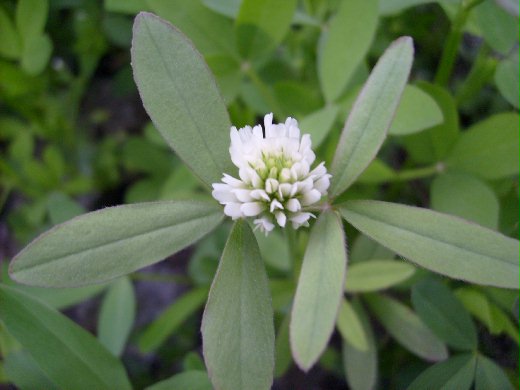111-2國科會人社中心補助「植栽世」學術研究群演講活動日期如附件,歡迎參考,謝謝。
Category: Latest News
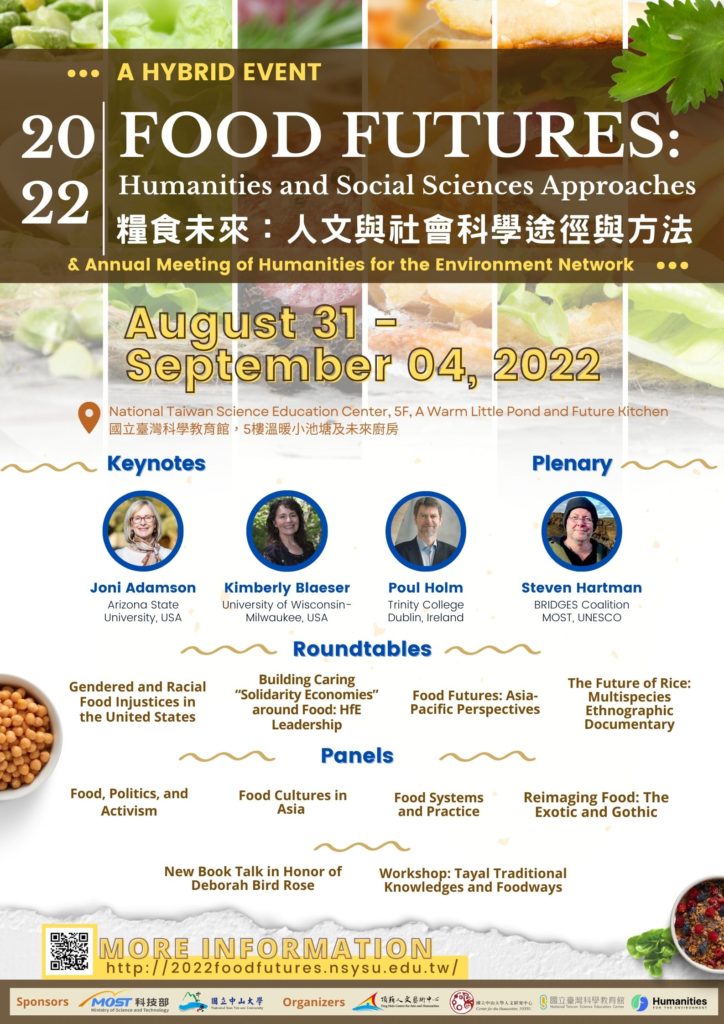
【2022 International Conference on Food Futures】
會議報名網址/Registration:
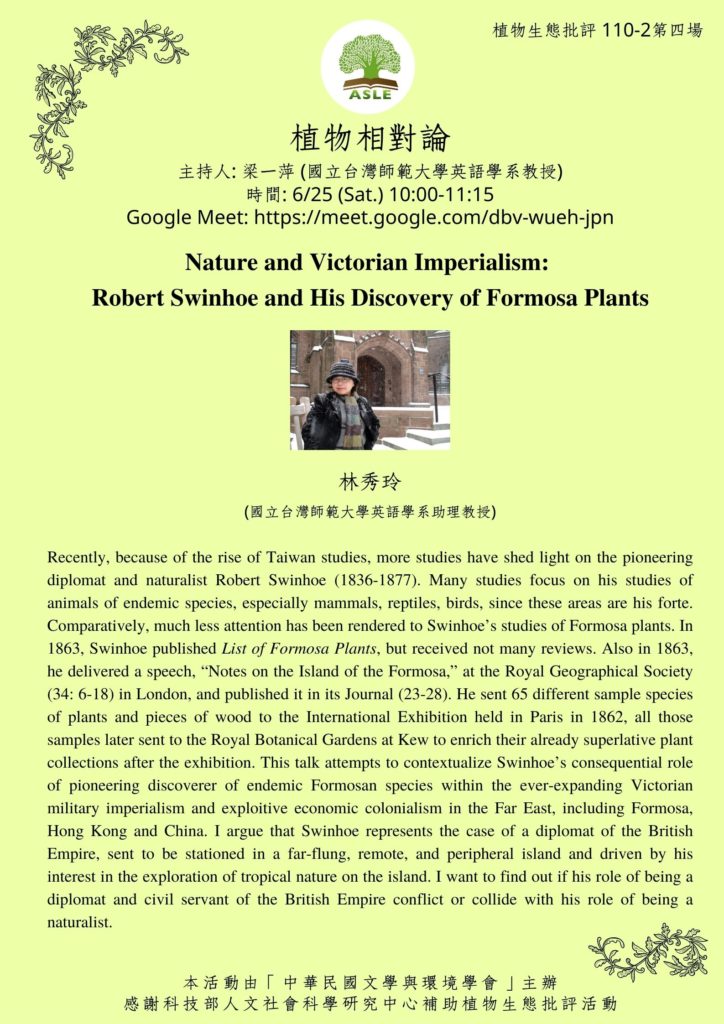
[植物生態文學研究]研讀班110-2第四場活動
※會議連結: https://meet.google.com/dbv-wueh-jpn【活動時間】: 6/25(六)10:00-11:15
【研讀主題】:Nature and Victorian Imperialism: Robert Swinhoe and His Discovery of Formosa Plants
【主講人】: 林秀玲 ( 國立臺灣師範大學英語學系助理教授 )
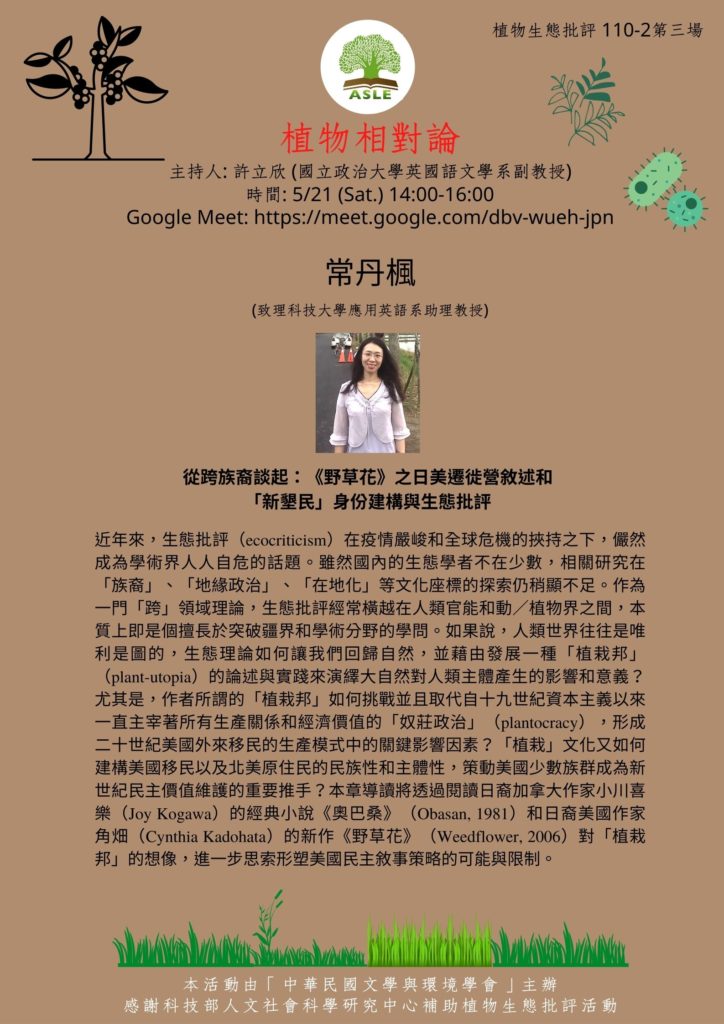
「植物生態批評」研讀班110-2第三場活動
※會議連結: https://meet.google.com/dbv-wueh-jpn【活動時間】: 5/21(六)14:00-16:00
【研讀主題】:從跨族裔談起:《野草花》之日美遷徙營敘述和「新墾民」身份建構與生態批評
【主講人】: 常丹楓 ( 致理科技大學應用英語系助理教授 )
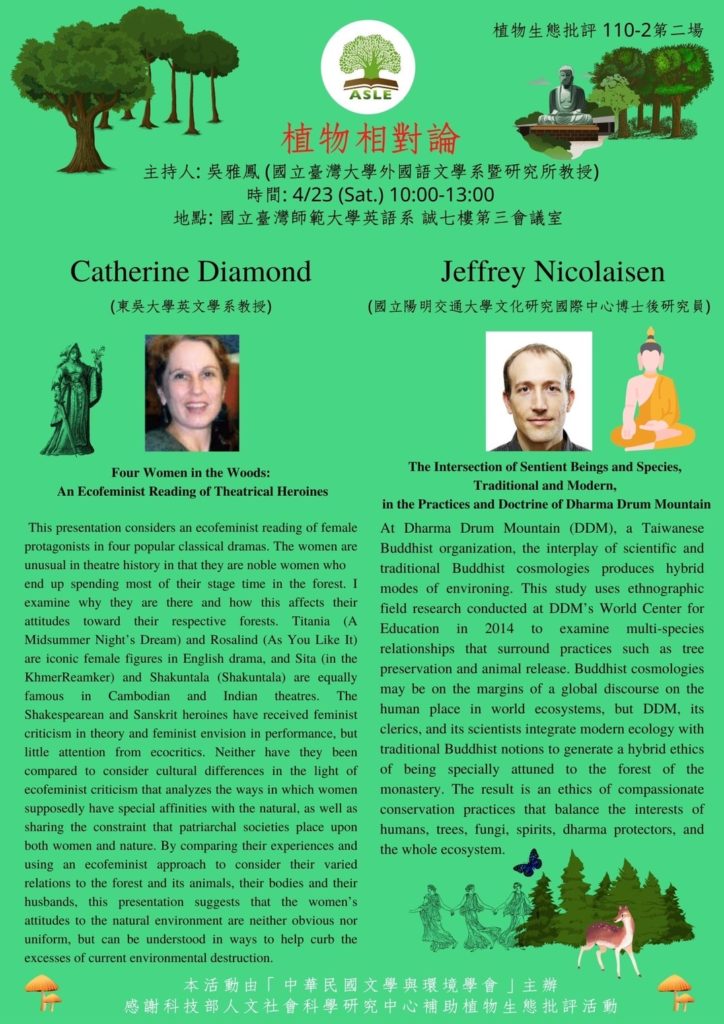
[植物生態批評]研讀班110-2第二場活動
※此次活動在 國立臺灣師範大學英語系誠七樓第三會議室進行
【活動地點】:國立臺灣師範大學英語系誠七樓第三會議室
【報名網址】:https://forms.gle/SP8WVcG2hL463xVt9【研讀主題1】: Four Women in the Woods: An Ecofeminist Reading of Theatrical Heroines
Nicolaisen, Jeffrey. “The Intersection of Sentient Beings and Species, Traditional and Modern, in the Practices and Doctrine of Dharma Drum Mountain.” Chinese Environmental Humanities: Practices of Environing at the Margins, edited by Chia Ju Chang, Palgrave Macmillan, 2019, pp. 289-308.
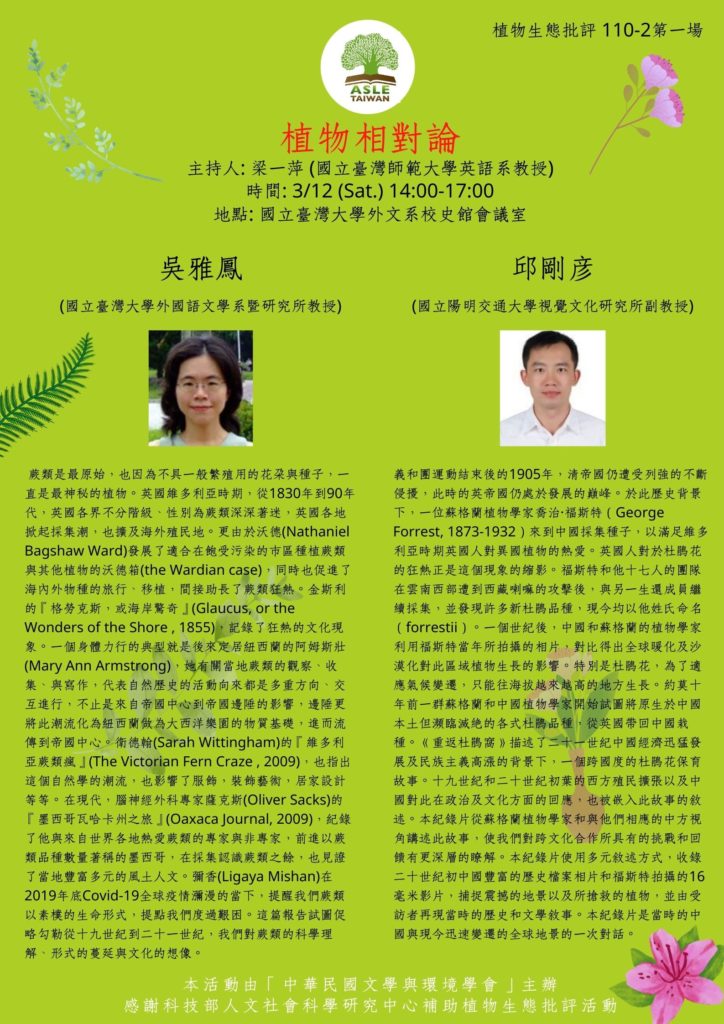
110-2 研讀班第一場活動
獲科技部人社中心經費補助之”植物生態批評”研讀班110-2第一場活動,即將於3月12日(週六)下午2:00-5:00舉行,研讀主題為「 蕨類狂熱:英國採集瘋與太平洋樂園 」,導讀人為國立臺灣大學外文系吳雅鳳教授,以及「 紀錄片–重返杜鵑窩」,導讀人為國立陽明交通大學視覺文化研究所邱剛彥副教授,主持人為國立台灣師範大學英語系梁一萍教授,歡迎踴躍報名參加。
※本次活動報名將於3/8截止。
※此次活動在臺大外文系校史館會議室舉行
【活動時間】: 3/12(六)14:00-17:00
【活動地點】:國立臺灣大學外文系校史館會議室
【報名網址】:https://forms.gle/jAbDqNkXR2PHvDvu9
【研讀主題1】: 蕨類狂熱:英國採集瘋與太平洋樂園
Duggins, Molly. “‘The world’s fernery’: New Zealand, fern albums, and nineteenth century fern fever.” New Zealand’s empire, edited by Katie Pickles and Catharine Coleborne, Manchester University press, 2015, pp.102-123.
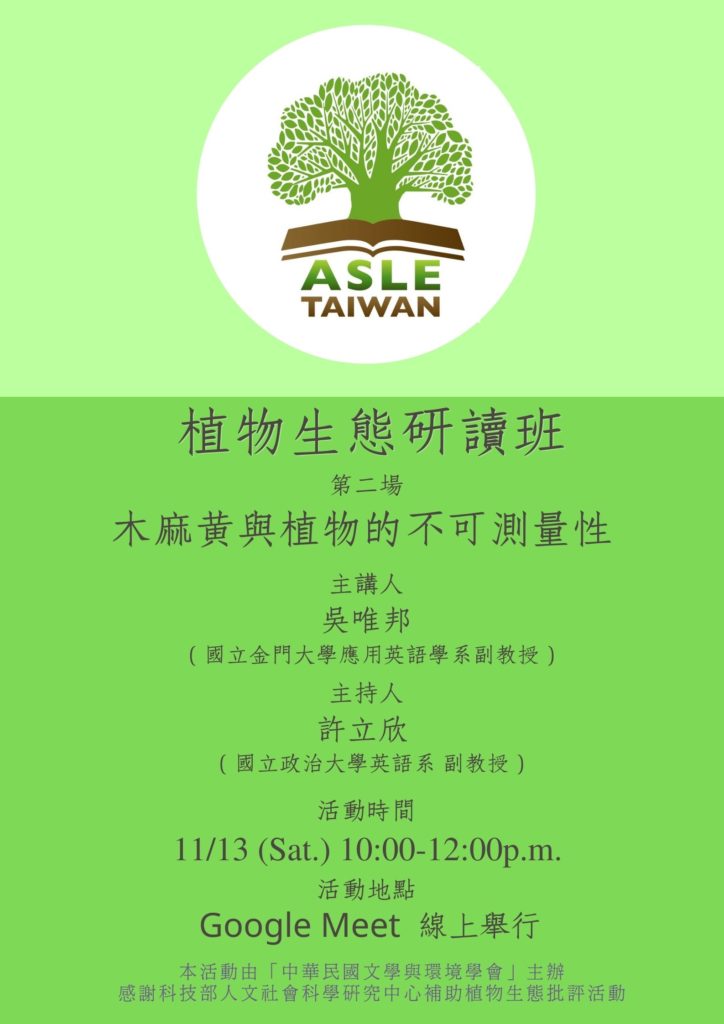
植物生態文學研讀班第二場:木麻黃與植物的不可測量性
※本次活動報名將於11/06截止。
※此次在google meet上進行線上讀書會,將於11/12寄會議連結給報名者。
【活動地點】:線上進行
【報名網址】:https://forms.gle/wNpFdiZjWpVyyHNP8
研讀主題: 木麻黃與植物的不可測量性
主講人:吳唯邦(國立金門大學應用英語學系副教授)
主持人:許立欣(國立政治大學英語學系副教授)
主辦單位:科技部人文社會科學研究中心、中華民國文學與環境學會
協辦單位:國立台灣師範大學英語系
《中外文學》徵稿啟事
簡介:
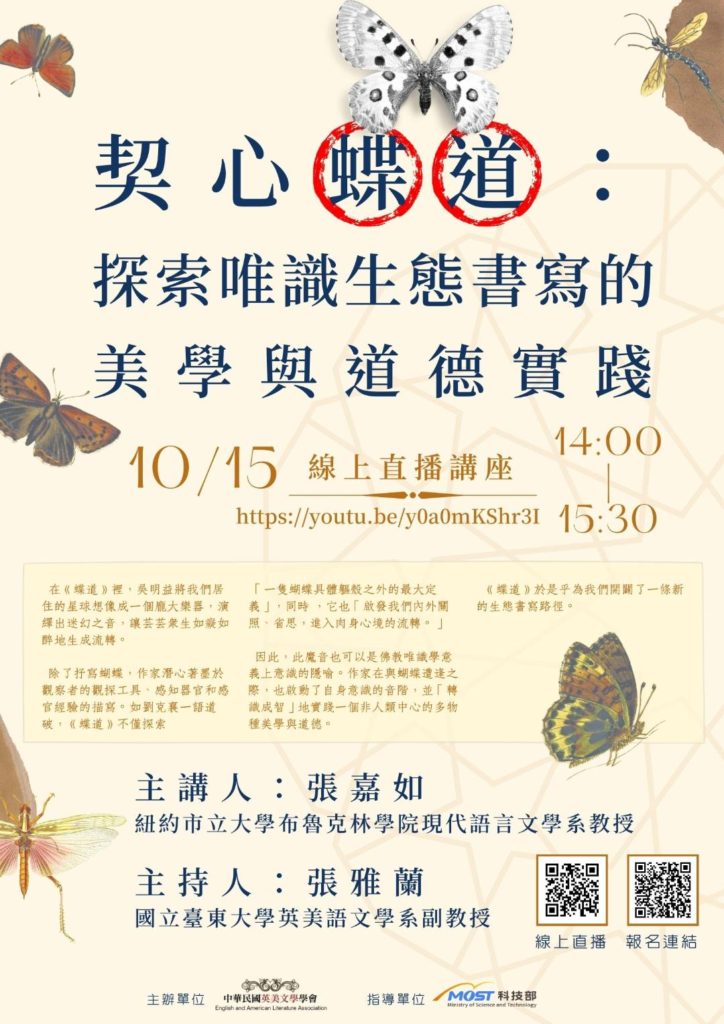
2021/10/15「契心蝶道:探索唯識生態書寫的美學與道德實踐」
中華民國英美文學學會將於10/15(五) 舉辦「契心蝶道:探索唯識生態書寫的美學與道德實踐」線上直播講座。
在《蝶道》裡,吳明益將我們居住的星球想像成一個龐大樂器,演繹出迷幻之音,讓芸芸眾生如癡如醉地生成流轉。
除了抒寫蝴蝶,作家潛心著墨於觀察者的觀探工具、感知器官和感官經驗的描寫。如劉克襄一語道破,《蝶道》不僅探索“一隻蝴蝶具體軀殼之外的最大定義”,同時 ,它也“啓發我們內外關照、省思,進入肉身心境的流轉。”
因此,此魔音也可以是佛教唯識學意義上意識的隱喻。作家在與蝴蝶遭逢之際,也啟動了自身意識的音階,並“轉識成智”地實踐一個非人類中心的多物種美學與道德。
《蝶道》於是乎為我們開闢了一條新的生態書寫路徑。
歡迎有興趣的觀眾線上觀看直播,詳細活動資訊如下:
【主講人】張嘉如 (紐約市立大學布魯克林學院現代語言文學系教授)
【主持人】張雅蘭 (國立臺東大學英美語文學系副教授)
【時間】2021年10月15日 (五) 下午14:00至15:30
【報名網址】https://tinyurl.com/rh8zt7wc
【線上直播連結】https://youtu.be/y0a0mKShr3I
【學會臉書】https://www.facebook.com/EALAtaiwan/
【臉書活動連結】https://www.facebook.com/events/546044516644846
指導單位: 科技部
主辦單位: 中華民國英美文學學會
*活動資訊日後若有更動,主辦單位保留修改權利,敬請留意學會消息;若有任何疑問,也歡迎來信洽詢~
E-mail: ealataiwan@gmail.com
學會網站: http://www.eala.org.tw
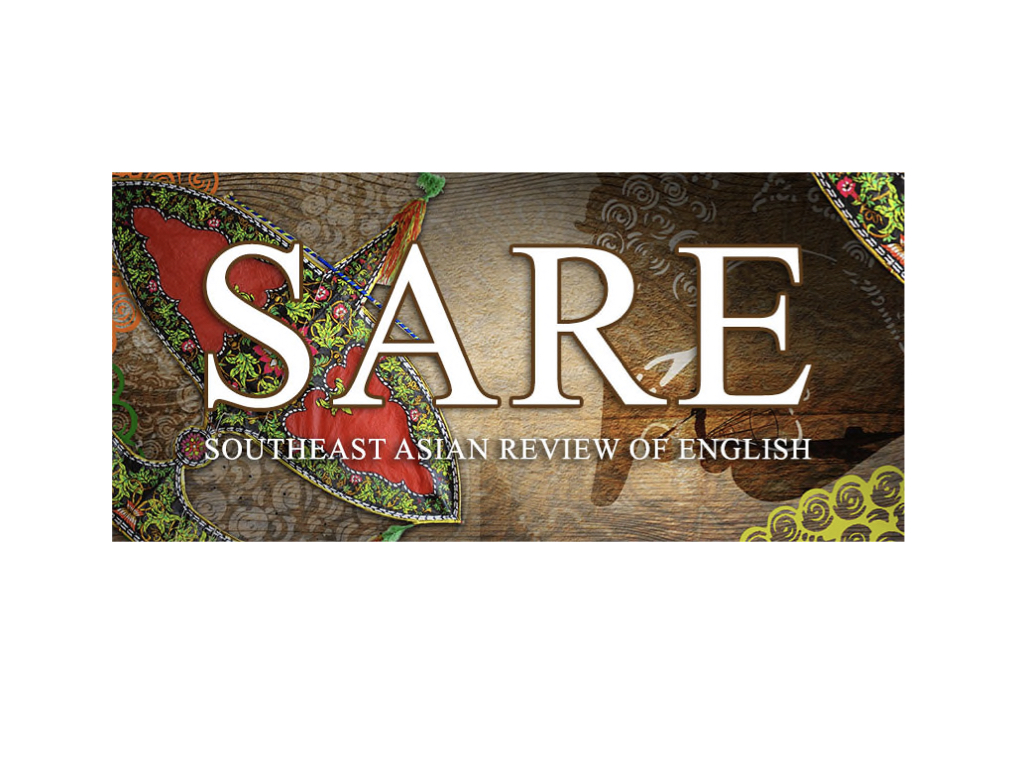
Call for Papers:”EcoGothic Asia: Nature, Asia, and the Gothic Imagination”
CALL FOR PAPERS
“EcoGothic Asia: Nature, Asia, and the Gothic Imagination”
Guest Editor: Associate Professor Li-hsin Hsu
Since the emergence of modernity, the perceived eastern emphasis on the harmony between humanity and nature has been profoundly challenged and reshaped by the process of industrialization. Asia as a geo-poetic imaginary and a geo-political locus of both utopic imagination and dystopic anxiety in literature – both non-Asian and Asian – magnifies, problematizes, or sometimes accelerates such a disquieting and polarized projection. The “EcoGothic”, as an interdisciplinary approach that investigates the intersection between the ecological and the Gothic imagination, provides a useful epistemological and methodological tool to rethink how aesthetics, philosophical thoughts and social-cultural or environmental discourses in (or about) the Asian / Pacific region complicate our understanding of human-nonhuman interactions.
We invite submissions for a special issue of SARE to explore the enmeshed human-nonhuman relationship by examining the interconnectedness between the natural, the supernatural or the unnatural, the diseased, (dis)possessed and contagious bodies – human or nonhuman – the haunted as well as haunting landscapes, and the terrifying or monstrous flora and fauna in literature in or about Asia. We ask how the EcoGothic imagination in (or about) Asia conceptualizes or addresses the notion of human-nature co-existence or the precarious state of human-nonhuman (dis)harmony. How does reading literatures of ecological crises, disasters, or extinctions help us reimagine Asia as a heterogeneous geography, both symbolically and in reality? In an age of the Anthropocene, how are our perceptions of human-nonhuman interactions redefined by the COVID-19 pandemic or other environmental/ecological crises? How does local knowledge address global issues in the environmental humanities from or about this region?
Submissions might consider how recent theories of ecologies, technologies, philosophies or sociologies might renew our ways of reading literature about human-nonhuman interactions in our time. Papers might also consider how the notion of Asia is represented or reconfigured in relation to contemporary events or interdisciplinary approaches and narratives, or how reading environmental works, both Asian and non-Asian, might assist our understanding of the EcoGothic as a multifaceted concept in refreshing directions.
Topics might include, but are not limited to:
Asia and the (un)natural / supernatural
Transcultural / Transpacific Gothic
The Gothic and Orientalism
Gothic gardens and tropical wildlife
Volcanic islands and vengeful oceans
Aliens, monsters, or ghosts / spirits in an Asian context
The inhuman, transhuman, anti-human, more-than-human / posthuman
Apocalyptic / dystopic imagination and the (non)Asian other
Deserted rural areas and haunted urban landscapes
Indigeneity and environmental injustice
Invasive species and regional Gothic
Disorder / excess / transgression in nature
Diseases and extinction
Bodily contagion and dis / trans-figuration
Migration, displacement and (im)mobility
Fear of the nonhuman world and / or the wilderness
Ecological crises and race / gender / class (in)equality
Strange natures and queer ecologies
This SARE special issue invites papers, of between 5000 and 7000 words, that address, but need not be limited to, the above questions.
Abstracts of 200 words (maximum), along with a 50-word author bio, are to be emailed to The Editor, SARE at sare@um.edu.my, with a copy to the Guest Editor at johsu@mail2.nccu.tw, by 15 November 2021.
Decisions will be sent out by 30 November 2021.
The deadline for the submission of full papers is 1 March 2022. Submissions should be in English and uploaded to the SARE website through the “Make a Submission” portal at https://sare.um.edu.my.
Further submission guidelines can be found on our website.
Publication date: July 2022
If you have any questions related to the special issue, please direct your inquiries to The Editor, SARE at sare@um.edu.my.
